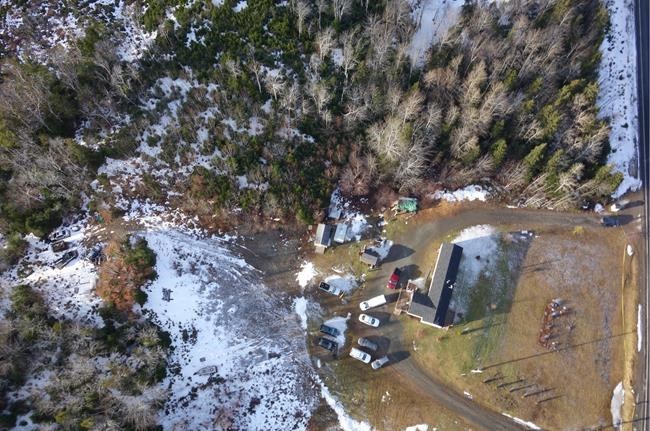PORT HAWKESBURY, N.S. — An inquiry investigating why a former Canadian soldier killed his family and himself in 2017 heard Monday from a close relative who said Lionel Desmond's mental health appeared stable after he served in Afghanistan in 2007.
But Shonda Borden said Desmond suffered a dramatic decline after he left the military in 2015.
Borden, the younger sister of Desmond's wife, Shanna, told the inquiry that she lived with the couple and their young daughter in Oromocto, N.B., near Canadian Forces Base Gagetown, between 2008 and 2012.
Borden said Desmond was a cheerful, fun-loving man when she first met him when she was 16 years old, and she described his relationship with his wife as normal, even after his particularly violent tour of duty overseas.
"It was a normal relationship," she testified via a video link from her home in Regina. "They had little arguments here and there."
Despite the harmonious relationship, Borden recalled how her sister once told her about how he had a nightmare and she awoke to find him trying to strangle her.
"He was quite shaken up by it," Borden said. "They talked it through .... She was very adamant that he needed help."
The inquiry has heard Desmond was diagnosed with post-traumatic stress disorder in 2011 while still in the military. He was medically discharged in 2015.
Between 2011 and 2015, Desmond received psychiatric treatment through the military, which included prescriptions for medical marijuana and other drugs, but the inquiry heard that his treatment was often interrupted by his trips to his hometown in eastern Nova Scotia.
Borden testified that Desmond, then a corporal with the infantry, complained about being a victim of anti-Black racism before he left the Canadian Armed Forces, and she made it clear Desmond's relationship with her sister started to deteriorate in 2012 and 2013, saying he would provoke arguments and become angry over petty disagreements.
She went on to describe how Desmond became convinced his wife was cheating on him. As well, he became more controlling, particularly in 2015-16, after his discharge, she said. Borden said the smallest irritant for Desmond could set off a daylong tirade.
"We used to call it his 'switch,'" she said. "It was like walking on egg shells."
Borden also confirmed that Desmond and his wife struggled to get him help for his worsening condition in 2016 after he returned home to Nova Scotia.
"In the end, it was becoming way too stressful for her," she said, adding that the couple talked of divorce. "They both told me they were done with each other."
Still, the couple continued to work together to find a solution to their problems, she said. Between June and August of 2016, Desmond took part in an intensive residential treatment program for veterans at Ste. Anne's Hospital in Montreal.
The inquiry has heard Desmond received no therapeutic treatment for the following four months, though he did try to get help by presenting himself at the emergency rooms at hospitals in Antigonish, N.S., and Guysborough, N.S.
About a month after he returned home to the Guysborough area, Desmond's mental state rapidly deteriorated, Borden said. Asked if she was concerned for the Desmond family's safety, Borden said she was.
At that point, Desmond starting sending her texts speculating that he might have schizophrenia or a brain tumour. He talked about concussions he suffered while in the military, and he also changed his name on his Facebook page to read "Lionel Demon."
"He constantly had dreams of Shanna cheating on him," she said. "Any time he got mad, he would talk about the devil and demons."
On Jan. 3, 2017, Desmond bought a rifle and later shot his 31-year-old wife, their 10-year-daughter Aaliyah, and his mother Brenda, 52, before killing himself in their home in Upper Big Tracadie, N.S.
In the months and years that followed, friends and relatives openly complained that Desmond's attempts to seek help for PTSD led him nowhere.
The inquiry is examining whether Desmond had access to mental health and domestic violence services, and whether he should have been able to buy a rifle. It is also investigating whether the health care and social services providers he dealt with were trained to recognize occupational stress injuries or domestic violence.
The inquiry, which started hearings in January 2020, resumed Monday after a month-long break prompted by the third wave of the COVID-19 pandemic.
This report by The Canadian Press was first published June 21, 2021.
— By Michael MacDonald in Halifax
The Canadian Press



